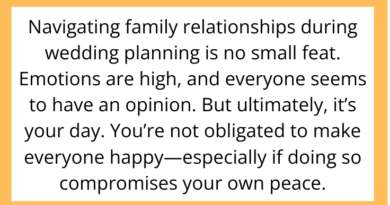AITAH for Not Attending My Sister’s Wedding Because She Banned My Husband?
Weddings are supposed to be joyful celebrations of love and family—but sometimes, they bring out the deepest divisions. Today’s AITAH scenario dives into a situation that has torn a family apart: When loyalty to your spouse conflicts with loyalty to your blood, where should you draw the line?
The Situation: A Wedding Invitation With Strings Attached

A 32-year-old woman—let’s call her Sara—shared her story on r/AITAH, and it quickly ignited a fierce debate.
Sara’s younger sister, Emily, 28, was getting married. The two sisters had always been close, until Emily announced she didn’t want Sara’s husband, Tom, at the wedding.
The reason? Four years ago, Tom and Emily had a heated argument over a family inheritance. Emily claimed Tom was manipulative and disrespectful, and she never forgave him. Despite Sara’s repeated attempts to smooth things over, Emily held her ground: Tom was not welcome.
When Sara received the invitation—with Tom explicitly uninvited—she was heartbroken. She told Emily she wouldn’t attend without her husband. Emily accused her of choosing a man over her own sister.
Sara turned to Reddit: AITAH for skipping my sister’s wedding because she banned my husband?
Family Feud or Fair Boundary?

Why Emily Felt Justified
Emily’s perspective wasn’t entirely unreasonable. From her viewpoint, Tom’s behavior had been hurtful and unforgivable. Her wedding day was meant to be stress-free, and she didn’t want to pretend everything was fine.
She insisted she had the right to control her guest list. “It’s my day,” Emily told Sara. “I don’t want him there.”
Many Reddit commenters agreed—emotional safety matters, especially at big milestones.
Why Sara Felt Torn
But Sara wasn’t willing to leave her husband behind. Tom had apologized years ago, and while he and Emily never reconciled, Sara believed the family should have moved forward.
She also felt it was a matter of respect. “If my husband isn’t welcome, then I’m not welcome,” she wrote.
Her parents were furious that she refused to attend, accusing her of destroying the family over her “pride.” Sara insisted it was about loyalty and unity in her marriage.
Reddit Weighs In: Who’s the Villain?

Thousands of commenters chimed in with strong opinions.
The majority sided with Sara.
“Your marriage comes first,” one user wrote. “If you had gone, you’d be validating Emily’s grudge and disrespecting your husband.”
Others argued Emily’s decision was controlling and unnecessary, especially years after the incident.
However, a significant minority sympathized with Emily.
“She doesn’t have to play nice on her wedding day,” one comment read. “If she feels unsafe or disrespected, she can choose her own guest list.”
The Deeper Issue: Loyalty vs. Independence

This situation reveals a deeper conflict many couples face:
-
Should you prioritize your spouse’s feelings over your family’s wishes?
-
Is it ever acceptable to exclude someone permanently for past behavior?
-
Can a family truly move on if no one is willing to compromise?
Sara and Emily’s standoff shows that sometimes, even a wedding can become a battlefield for unresolved resentment.
What Could Sara Have Done Differently?

Some Redditors suggested a middle ground:
-
Attend the ceremony but skip the reception.
-
Send a heartfelt card and a gift, even if not attending.
-
Meet privately with Emily afterward to maintain the relationship.
Ultimately, Sara decided that solidarity with her husband mattered most. She didn’t want to set a precedent that he could be excluded from family events.
The Takeaway: You’re Not Always the Villain for Choosing Your Partner

This AITAH dilemma resonates because it touches on a question so many people grapple with: When is it okay to stand your ground, even if it means hurting someone you love?
Sara chose her marriage over her sister’s wedding, and while it may have caused a rift, it was a decision she made to protect her values and her relationship.
It’s a reminder that sometimes, there are no easy answers—only the choices you can live with.



